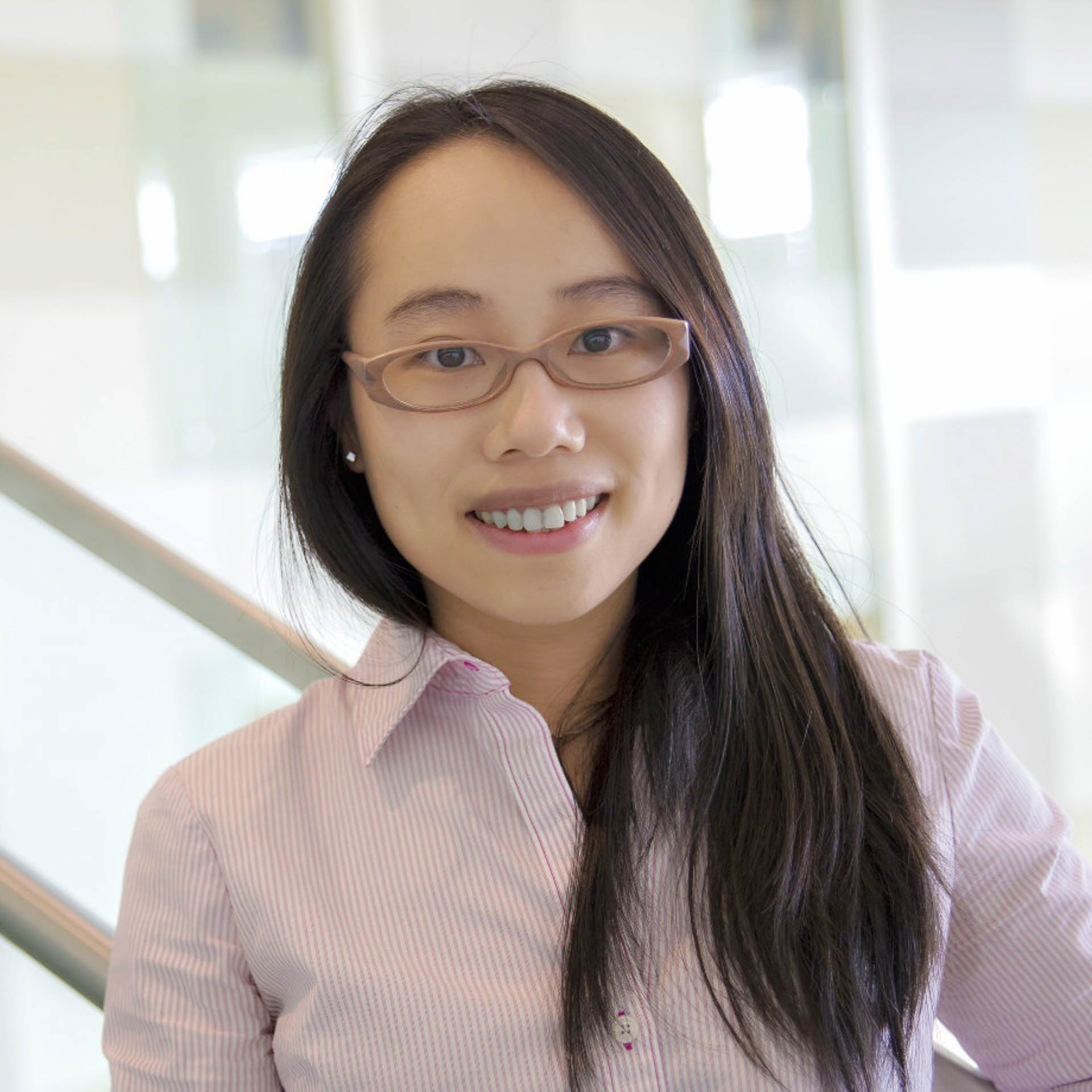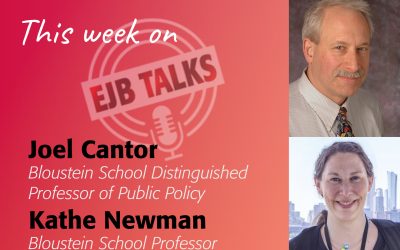Autonomous vehicles will bring both powerful solutions and incredible challenges to the future of transportation. In this episode of EJBTalks, Stuart Shapiro talks with Assistant Professor Wenwen Zhang about her research on the adoption of autonomous vehicles, how AVs may bring both sustainability and equity to our society and how she uses big data analysis to predict possible outcomes as accurately as possible. Professor Zhang also discusses Bloustein’s newest program, the Master of Public Informatics, and how this program equips students with the ability to collect and analyze big data and successfully synthesize and communicate the results into the policymaking process.
Stuart Shapiro
Welcome to EJB Talks. I’m Stuart Shapiro, the Associate Dean of Faculty at the Bloustein School. And the purpose of this podcast is to talk with my colleagues and our alumni about policy, planning, and health, the interaction between these issues, and how they affect people in New Jersey, the United States and the world.
In keeping with the theme of the start of our season, we are talking with our new faculty. Today I’m speaking with Professor Wenwen Zhang, who is among our newest faculty members, having just started in September, and is part of our brand new Public Informatics program. Professor Zhang welcome.
Wenwen Zhang
Oh, thank you, Stuart, it’s very nice to join you on this podcast.
Stuart Shapiro
Thanks. Let’s start by talking a little bit about your research. Your recent interest has been in transportation planning and in automated vehicles, in particular. How did you become interested in this?
Wenwen Zhang
Well, so my master’s education, I tried to focus on the transportation concentration. And when you look at the history of transportation, you’ll find that the technology advancements in transportation tend to have a fundamental change in people’s travel behavior. So when automobiles were first introduced, you’ll see the huge urban sprawl and equity issues coming in, etc. And also, studies tend to reveal that people are animals of habit.
And once they get into one lifestyle, they tend to refuse to change unless there are major life events happening. So when I was in the second year of my Ph.D. education, I came across this concept of autonomous vehicles at a conference. And it hit me so hard that it seemed amazing to me. It’s just the next opportunity for us as planners to introduce a more sustainable and equitable mobility system into society, into our city. With more proper policy interventions to guide through the process is that just so I guess, very amazed by this concept.
Stuart Shapiro
That’s great. I will say, you know, this sort of getting wedded into systems there. When I told my mother about the topic of the next podcast, she said, “Automated vehicles? I don’t like that idea. I don’t trust that.” (laughing)
And I think for many of us, you know, it still seems like science fiction, it’s like the flying cars in The Jetsons. Where do we think automated vehicles will be adopted? And who do you think is going to be adopting them?
Wenwen Zhang
Right. So if you look at it from the transportation system perspective, it seems like modern supply chains or the freight companies are going to adopt them first. And maybe next is long-distance travel, because technology tends to work much better on the highways when the traffic environment is simple. Then eventually, it’s going to merge into the urban system. So, Waymo just opened up their SAV (Shared Autonomous Vehicle) system called Waymo One, I think, to the general public in Arizona. So everybody has a chance to experience it now.
And from the people perspective, I would say a lot of studies have shown–which is consistent with your observations Stuart–older people are suspicious towards the technology and young people, tech-savvy, and maybe well-educated people are more likely to accept the technology. Like who will be the early adopter. But eventually, I think once it’s merged into society, more and more people will start to take advantage of it because it just releases you from the driving task.
Stuart Shapiro
Do you think there’s going to be an eventual outcome where almost all vehicles on the road are automated?
Wenwen Zhang
Well, it really depends on how our policies are designed and how our infrastructure adapts to it or not. So far, for the automated vehicle, to properly operate on highways, our urban system, we need a huge investment in those infrastructures, so that they can travel properly on these infrastructures. And when these technologies are first introduced, we probably will see that there will be dedicated lanes for those automated vehicles. And then the question becomes, how many lanes do we provide to those vehicles? And there is where equity questions are going to kick in.
So it really depends on how much resources we want and how much are we willing to invest in adopting the technology. Because the big, big tech companies are pushing it and lobbying it very hard. You can see that from the federal level. Everybody is having like a pro-AV opinion there. And in Michigan, I think, there is the first dedicated lane for automatic vehicles already operating.
Stuart Shapiro
Oh, that’s… I had no idea that that was already in place. I do think the transition period is going to be bumpy. When you have drivers and automated vehicles sharing the same roads. I think that could be a challenge.
Wenwen Zhang
Right, exactly. That’s why they want the dedicated lanes. And then here are our equitable questions.
Stuart Shapiro
Yes. Now, I mean, I could see why… why did those automated vehicles get the better traffic lane there would be a source of resentment.
Wenwen Zhang
Right.
Stuart Shapiro
Absolutely. So you’ve used some new analytical techniques to try and figure out what this adoption is going to look like. Can you talk a little bit about that?
Wenwen Zhang
Right. So, in the context that I’m working in, I’m trying to understand who is likely to adopt this technology. At least, using the currently stated preference surveys, etc. And so the goal is to predict as accurately as possible. So that’s why we’re using machine-learning algorithms to do the prediction. And when we come into the big data thing… like, when we want to simulate the entire population, then it comes with privacy concerns, and also data concerns. Like, how do we have a survey for the entire population, that’s going to cost us a lot. And also, probably not everyone wants to share their opinion, because of privacy concerns. So then we kick in the population synthesizing method, which tries to recreate the entire population without actually knowing what everybody is thinking, but controlling at the aggregating level so that the synthesized agents or population still representative, to understand who, at the neighborhood level, is willing to adopt it or not.
Stuart Shapiro
Yeah, and I would guess, stated preferences, you don’t even know whether to trust people’s answers.
Wenwen Zhang
Right.
Stuart Shapiro
To know, whether or not, how they feel about automated vehicles.
Wenwen Zhang
Right. That’s one of the limitations of many of the current studies. But once you have more AVs running on the road, and people get to experience them for real, then we will get more realistic or robust answers for the question.
Stuart Shapiro
Yeah. So that leads me to the other topic I wanted to cover with you. We’ve obviously, at the Bloustein School, sort of expanded into this area of informatics or “big data” as it’s commonly known. What other questions can these machine-learning and other big data techniques help us answer either in transportation or in other planning and policy areas?
Wenwen Zhang
Right. It’s actually very powerful. Almost like all urban management, different fields are adopting machine-learning and big data to help them to manage the system better. So, for transportation, we have big data to optimize our signals. For energy, we try to use machine learning to predict building energy consumption to optimize our grid systems. And also for water, we try to understand which area is going to be flooded if given a certain amount of rain, etc. So it has been shown it is very powerful in terms of helping to improve current urban management, especially the demand modeling part of it.
But also, we need to recognize that big data comes with its own limitations. That is, for example, we have privacy concerns, and also we have machine-learning model ethical concerns. Then more and more people start to participate in the conversation, and more and more we start to see we need more domain knowledge to guide the machine-learning model building to start to see how this model can eventually be used to properly guide the scientific policymaking process.
Stuart Shapiro
Yeah, and sort of tied to some of the other things Bloustein does and to our conversation last week with Professor Bhuyan. The healthcare sector, I think, also probably there are tremendous uses for these techniques. But also to address concerns.
Wenwen Zhang
Right, exactly. So especially for health, they have a huge amount of electronic health records. But that also comes with a lot of privacy concerns, because these are health data. That’s why some of the techniques that have been widely used are population synthesizing. Try to replace the real record, with synthesized data so that it can be easily more accessible by the researchers to conduct research, rather than worry about whether they are violating their privacy, like issues there.
Stuart Shapiro
Yeah, that’s a huge issue. And Professor Bhuyan also talked about cybersecurity as a significant issue there. Let me turn a little bit to the salesman role here. You know, we have a new public informatics degree, a Master’s in Public Informatics degree. What do you see as the primary goals of a degree like that?
Wenwen Zhang
From my perspective, it’s actually joining the domain knowledge with informatics skill sets. So together, we can equip our students to truly take advantage of the big data and the data size, to support data-driven policymaking.
Stuart Shapiro
So it could make a significant contribution to policy and planning in the years and decades ahead.
Wenwen Zhang
Right.
Stuart Shapiro
So you’re talking to a student, or you know, a student is talking to their parent, and they’re trying to convince them that it’s worth spending money on a public informatics degree. What’s the sales pitch there?
Wenwen Zhang
So I think one thing is that students are living in the era of big data. So there is a higher and higher demand for equipped workers, demand for the skill set for workers to access data, manage data, pre-process data and analyze data in a way that is meaningful for their domains. And while there are people from computer science departments who maybe can do all those things, but without the domain knowledge, then probably sometimes the management and the pre-processing process doesn’t make much sense, under certain policymaking environments. So actually, the future trend, I think, is to combine the domain knowledge together with those more advanced data processing skill sets, to help manage the urban systems better.
So just take one example. So for example, the access data. So we’re now in the “big data” era. So traditionally, when we say access data, we’re thinking about hitting the download button, and then boom, we have a CSV file, or we have an Excel file, etc. But nowadays, a lot of companies are not willing to just provide their data in the CSV format. One thing is that their data is so large, they do not have the human power to customize it for you to download as a manageable little file for your local area. So what they try to offer is offer API, Applicable Programming Interface, for the user to access data. But our traditional education doesn’t even equip students with the knowledge to say, “How do I access the data with API?” And without this, you cannot even get to the data in the first place, let alone analyze the data or provide policy implications out of it. So you’ll see there’s a higher and higher demand for the students to understand the latest technology.
And also the other thing that I think is very powerful for the people who work in the public or policy domain, is turning the data into results interpretation. How to communicate it effectively to the general public, or how to communicate effectively with the policymakers is also very important, but something that isn’t offered in the data science field or is not offered in the public policy traditional education. Which is why our public informatics degree is unique. It equips you with the skill set to effectively communicate the data and its results in a layman-accessible way to help inform the policymaking process.
Stuart Shapiro
Wonderful. Yeah, I do think it probably… there are plenty of organizations in the public and nonprofit sectors in particular, that have desperate needs for students with the kind of skills you’ve just described. And I do think there’s going to be a significant market for those students. Let me circle back with one final question for you. Back to your research. What questions do you see yourself studying in the years ahead using these techniques?
Wenwen Zhang
Yeah. So I still want to continue my research is transportation technologies to understand how and what are the social implications of the coming of these technologies? And how do we design policies to guide people to adopt those technologies more sustainably, like the automated vehicle, like the e-scooter or ride-hailing services? And from the other perspective, I’m also going to do more research in enhancing urban modeling and policymaking using more equitable machine learning models. Using both conventional and innovative data sets to inform the urban policy process. So, for example, currently, as machine learning has been widely used in many research areas, like urban modeling domains, but few of it is actually asking the question of whether we are building the model in an equitable way? It’s something that is, I want to say, is overlooked. So I want to look more into that question in the future.
Stuart Shapiro
Well, as you get those papers out, make sure you let me know and we’ll have you back on the podcast here.
Wenwen Zhang
I will definitely update you on this end.
Stuart Shapiro
Thanks. A big thank you to Professor Zhang for appearing today and to our production team, Amy Cobb and Karyn Olsen. We’ll be back next week with another talk from one of our new faculty members at the Bloustein School. Until then, stay safe.




